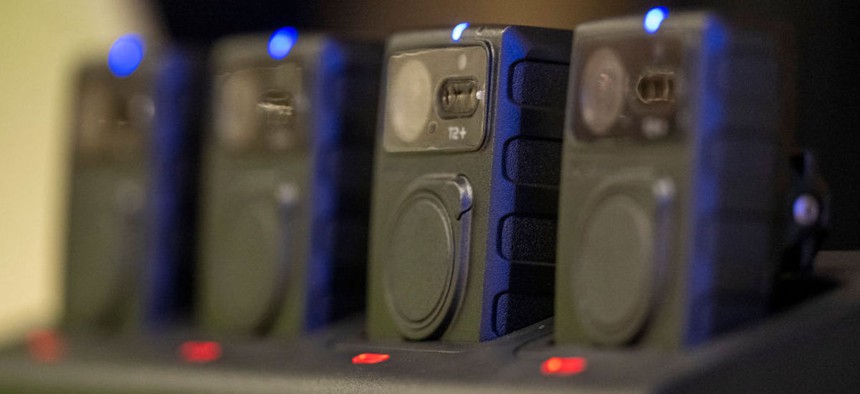Survey: Law enforcement surveillance technology is rapidly progressing, but AI raises concerns

Monika Skolimowska/picture alliance via Getty Images
A recent survey has found that as artificial intelligence tools are developed, law enforcement and local officials in Michigan are raising concerns over privacy and accuracy.
This story was originally published by the Michigan Advance.
Usage of surveillance technology by law enforcement agencies in Michigan has exploded in the last decade, but a recent survey conducted by the University of Michigan found that as artificial intelligence tools are developed, law enforcement and local officials are raising concerns over privacy and accuracy.
In 2015, about 23% of local governments that responded to University of Michigan researchers’ Michigan Public Policy Survey, or MPPS, reported that their local law enforcement used body cameras. In the 2024 survey that recently was released, 77% of local governments reported local law enforcement agencies were utilizing body cameras.
Stark increases in dashboard cameras and public surveillance cameras between 2015 and 2024 were found in the MPPS too, as well as an increase in the usage of drones to 31% of jurisdictions, compared to 3% of the state’s jurisdictions in 2015.
Several local law enforcement agency heads have offered testimony to lawmakers considering additional funding for public safety in the state budget at the moment, explaining the demand for improved technology when it comes to law enforcement.
As public trust in law enforcement has been a large conversation in recent years, with Michigan no exception, demand for tools to preserve accountability is high, said Rep. Mike Harris (R-Waterford) earlier this month after the state house approved the additional funding for public safety.
“If we’re going to hold our officers to a high standard and expect them to do professional policing, we have to be willing to invest,” said Harris, who served in law enforcement for more than 20 years in Michigan.
The police surveillance footage of 26-year-old Patrick Lyoya, an immigrant from the Congo being fatally shot by former Grand Rapids police officer Christopher Schurr in 2022 is circulating again this week as the trial for Schurr, who is charged with second-degree murder, begins. The footage caused public outcry for accountability for Lyoya’s death back in 2022, similar to the police killings of George Floyd in 2020 and Daunte Wright in 2021.
But while there have been clear increases in usage of surveillance by law enforcement and appetite for surveillance technology by the public, in terms of accountability, when it comes to usage of artificial intelligence technology in that sector, law enforcement and local government leaders have concerns.
About a third of leaders of local law enforcement agencies report that their departments have adopted or intend to adopt artificial intelligence or predictive technology, according to the 2024 MPPS.
Newer technology like automated license plate readers and facial recognition technology are not widely used, with 26% of agencies saying they use license plate readers and 10% reporting they use facial recognition. Only 3% of agencies said they used artificial intelligence or other predictive tools.
“AI is still in a bit of a Wild West phase,” Debra Horner, senior project manager on the survey said in a statement. “However, over a third of sheriffs and police chiefs saying they are currently using or soon to adopt predictive tools for policing and around half of prosecutors saying they at least somewhat trust AI or other automated applications for certain applications. That suggests it is a good time for the state of Michigan and individual local governments to consider developing formal regulations around transparent and responsible use of AI in law enforcement.”
The MPPS conveyed that there was interest from different levels of the criminal justice system in utilizing AI with 50% of elected county prosecutors who responded to the survey stating that at least somewhat trust AI applications that work to identify high-risk neighborhoods.
However, 66% of those county prosecutors said they were unsure if predictive policing tools made more or less accurate assessments than human-created assessments and 59% of the responding sheriffs felt the same way.
Alarm bells have also been rung by stakeholders, such as the Michigan Department of Civil Rights, or MDCR, who believe some automated technology has been programmed with racial biases across different fields, with some research reflecting that facial recognition technologies lead to disproportionate arrests of Black people.
“…all law enforcement agencies in the State of Michigan should review their current and future uses of Artificial Intelligence policing tools to determine their efficacy and tendencies to perpetuate, incorporate or facilitate bias and discrimination,” said a 2024 resolution by the MDCR.
Ferris State University Professor Greg E. Gogolin, who created the undergraduate Artificial Intelligence degree at the school, told the Michigan Advance that Michigan is not adequately creating a workforce prepared to best utilize AI or compete with other country’s expertise.
Many companies and industries want to jump on the “AI bandwagon” but few have taken into consideration that there isn’t significant investment into educating workers in this emerging technology, Gogolin said.
In the few higher education programs in Michigan that permit focuses in AI, Gogolin said many of those taking the courses are international students who will benefit industries in country’s abroad. However, he says if the state of Michigan wants law enforcement and other sectors to be versed in AI tools, it has to start with education and also an entire infrastructure to accommodate the technology.
Security on the data from the AI technology is another major concern point, Gogolin said. Michigan’s legislature is currently facing the task of legislating cyber crimes utilizing AI and the state currently doesn’t have a criminal justice system best equipped to handle the prosecution of such breaches so there is a lot of room for improvement to foster an environment prepared for AI.
Expecting law enforcement agencies to quickly be able to masterfully use AI would be similar to handing officers firearms without significant training, Gogolin said.
“We’re not even training our own citizens, right? Expertise is growing much, much faster outside the United States,” Gogolin. “Something has to change very, very soon. Or we’re going to be so far beyond the ticking point that we’re never going to be able to catch up.”
Michigan Advance is part of States Newsroom, a nonprofit news network supported by grants and a coalition of donors as a 501c(3) public charity. Michigan Advance maintains editorial independence. Contact Editor for questions: info@michiganadvance.com.





